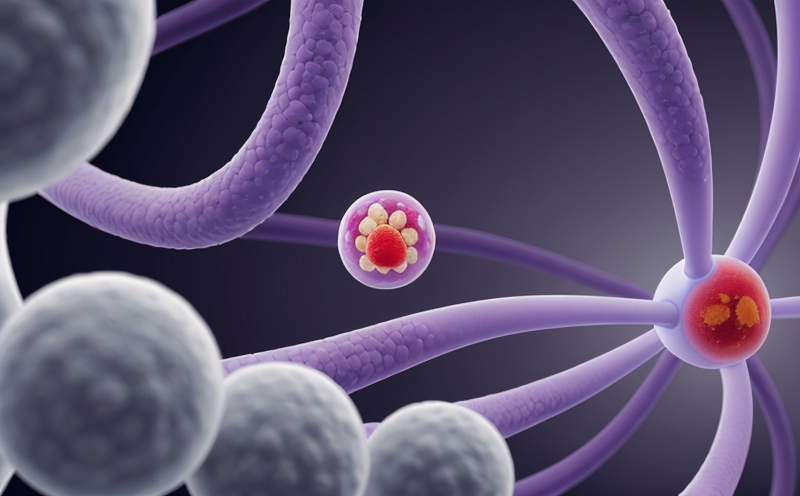NF-κB Pathway Activation Testing in Cancer Research
The nuclear factor kappa-light-chain enhancer of activated B cells (NF-κB) pathway plays a pivotal role in cancer progression, proliferation, and survival. Its dysregulation is linked to various cancers including but not limited to lymphomas, leukemias, and solid tumors such as breast, colorectal, and pancreatic cancers. Understanding the activation mechanisms of this critical signaling pathway can provide valuable insights into therapeutic targets for personalized medicine approaches.
At our laboratory, we offer comprehensive NF-κB pathway activation testing services tailored specifically for cancer research. Our state-of-the-art facilities are equipped with advanced technologies that enable precise measurements and robust data analysis. The service includes detailed specimen preparation procedures ensuring accurate results. For instance, cells or tissues from the patient sample undergo stringent extraction methods followed by specific assays targeting key components of the NF-κB pathway.
The testing process involves multiple steps starting from initial cell culture where optimal conditions for activation are established. This is followed by treatment with stimuli known to induce NF-κB activity such as TNF-alpha or LPS. Afterward, our team uses ELISA kits designed to detect phosphorylated p65 subunit which serves as a biomarker indicative of active NF-κB signaling. Additionally, western blotting techniques are employed to quantify total and phosphorylated forms of RelA/p50 proteins within the cell extracts.
Our laboratory adheres strictly to international standards such as ISO 17025 for quality assurance ensuring reliability and reproducibility of results across different laboratories worldwide. Compliance with these stringent guidelines ensures that all data generated from our testing services are trustworthy and acceptable both nationally and internationally.
The importance of this service lies in its potential to aid researchers in identifying new therapeutic targets by elucidating the mechanisms behind cancer cell resistance against conventional treatments like chemotherapy or radiotherapy. By pinpointing specific subunits involved in NF-κB pathway activation, scientists can develop more targeted drugs aimed at inhibiting these pathways thus enhancing treatment efficacy while minimizing side effects.
Moreover, understanding how various genetic mutations affect NF-κB activity could lead to better prognostic tools for predicting patient outcomes based on their unique genomic profiles. This information would be invaluable in guiding clinical decisions regarding personalized therapy plans.
Why It Matters
The role of the NF-κB pathway in cancer biology cannot be overstated; it influences multiple aspects including inflammation, apoptosis regulation, angiogenesis, and metastasis. Dysregulated activation of this pathway has been implicated not only in tumorigenesis but also in promoting tumor progression by enhancing cell survival against stressors such as chemotherapy drugs or radiation therapy.
Research into NF-κB signaling pathways holds promise for developing novel therapeutic strategies targeting specific subunits involved in the pathway. These could potentially restore balance to aberrantly activated pathways thereby sensitizing cancer cells to standard treatments. For example, inhibitors that block p65 translocation from cytoplasm to nucleus or prevent IkB kinase (IKK) complex formation represent promising avenues for intervention.
Understanding how genetic variations within the NF-κB family members impact disease susceptibility and progression is crucial for tailoring treatment regimens according to individual patient characteristics. Such knowledge could revolutionize cancer management strategies towards precision medicine where therapies are customized based on molecular signatures rather than general classifications.
Applied Standards
The testing procedures we follow adhere closely to international standards such as ISO 17025 for proficiency in analytical services. These guidelines ensure that our methodologies meet the highest industry benchmarks regarding precision, accuracy, and reliability.
We also comply with specific recommendations outlined by organizations like the American Society for Clinical Pathology (ASCP), which provides detailed protocols for specimen collection and preparation. Compliance with these standards guarantees consistency and comparability of results across different laboratories worldwide.
Additionally, we align our practices with those established by major biotechnology companies involved in cancer research, such as Merck KGaA, Darmstadt, Germany, whose work focuses on immuno-oncology treatments which often target pathways like NF-κB. By adhering to these stringent criteria, we ensure that our testing services contribute meaningfully towards advancing knowledge in this field.
Competitive Advantage and Market Impact
- Innovative Analytical Techniques: Our laboratory employs cutting-edge technologies such as next-generation sequencing (NGS) to identify mutations affecting NF-κB activity, offering unparalleled insights into individual patient profiles.
- Precision Medicine Insights: By providing precise measurements of phosphorylated p65 subunit and total RelA/p50 proteins, our tests contribute significantly towards precision medicine efforts aimed at tailoring treatments based on molecular signatures rather than broad classifications.
- Comprehensive Coverage: We cover a wide range of cancer types including lymphomas, leukemias, and solid tumors such as breast, colorectal, and pancreatic cancers ensuring comprehensive support for diverse research projects.
- Global Acceptance: Adherence to international standards ensures that our results are widely accepted both nationally and internationally making them valuable assets in global collaborations and publications.
Our services stand out due to their ability to provide precise, reliable data essential for advancing cancer research. This precision is particularly important given the complexity of NF-κB pathway regulation and its diverse roles in different types of cancers. By offering robust testing services, we help researchers navigate these complexities more effectively.





